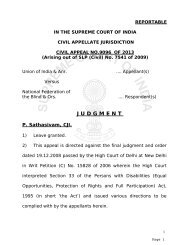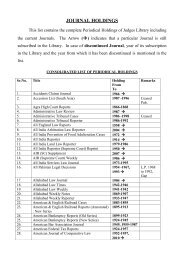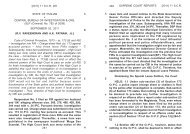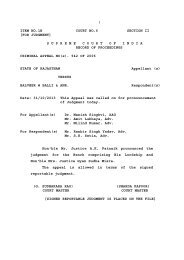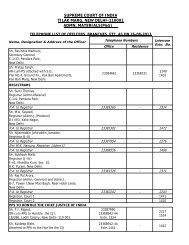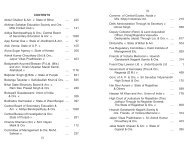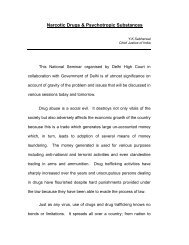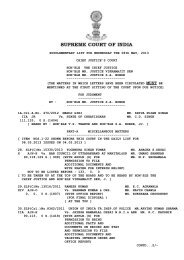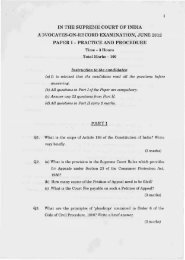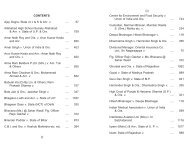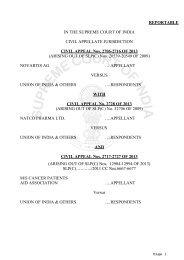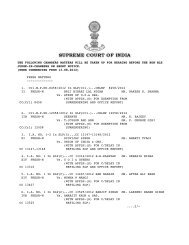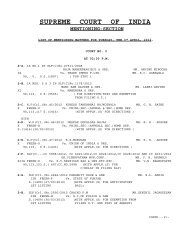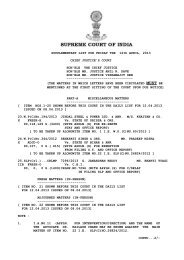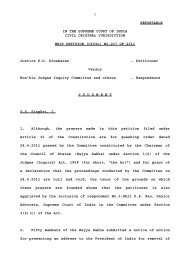Part No.IV - Supreme Court of India
Part No.IV - Supreme Court of India
Part No.IV - Supreme Court of India
Create successful ePaper yourself
Turn your PDF publications into a flip-book with our unique Google optimized e-Paper software.
SARADAMANI KANDAPPAN v. S. RAJALAKSHMI &<br />
ORS. [R.V. RAVEENDRAN, J.]<br />
delivery <strong>of</strong> possession <strong>of</strong> one room on the ground floor was<br />
given. In cross-examination it was deposed that since<br />
income-tax clearance certificate had not been obtained the<br />
sum <strong>of</strong> Rs. 98,000 was not paid. Unless the property was<br />
redeemed the payment would not be made. If this was the<br />
attitude it is clear that the plaintiff was insisting upon delivery<br />
<strong>of</strong> possession as a condition precedent for making this<br />
payment. The income-tax certificate was necessary only<br />
for completion <strong>of</strong> sale. We are unable to see how these<br />
obligations on the part <strong>of</strong> the defendant could be insisted<br />
upon for payment <strong>of</strong> Rs. 98,000. Therefore, we conclude<br />
that though as a general proposition <strong>of</strong> law time is not the<br />
essence <strong>of</strong> the contract in the case <strong>of</strong> a sale <strong>of</strong> immovable<br />
property yet the parties intended to make time as the<br />
essence under Clause (1) <strong>of</strong> the suit agreement.”<br />
The intention to make time stipulated for payment <strong>of</strong><br />
balance consideration will be considered to be essence <strong>of</strong> the<br />
contract where such intention is evident from the express terms<br />
or the circumstances necessitating the sale, set out in the<br />
agreement. If for example, the vendor discloses in the<br />
agreement <strong>of</strong> sale, the reason for the sale and the reason for<br />
stipulating that time prescribed for payment to be the essence<br />
<strong>of</strong> the contract, that is, say, need to repay a particular loan<br />
before a particular date, or to meet an urgent time bound need<br />
(say medical or educational expenses <strong>of</strong> a family member) time<br />
stipulated for payment will be considered to be the essence.<br />
Even if the urgent need for the money within the specified time<br />
is not set out, if the words used clearly show an intention <strong>of</strong> the<br />
parties to make time the essence <strong>of</strong> the contract, with reference<br />
to payment, time will be held to be the essence <strong>of</strong> the contract.<br />
20. Let us consider the terms <strong>of</strong> the agreement <strong>of</strong> sale in<br />
this case to find out whether time was the essence. The<br />
standard agreements <strong>of</strong> sale normally provide for payment <strong>of</strong><br />
earnest money deposit or an advance at the time <strong>of</strong> execution<br />
<strong>of</strong> agreement and the balance <strong>of</strong> consideration payable at the<br />
915 916<br />
A<br />
B<br />
C<br />
D<br />
E<br />
F<br />
G<br />
H<br />
A<br />
B<br />
C<br />
D<br />
E<br />
F<br />
G<br />
H<br />
SUPREME COURT REPORTS [2011] 8 S.C.R.<br />
time <strong>of</strong> execution/registration <strong>of</strong> the sale deed. In the absence<br />
<strong>of</strong> contract to the contrary, the purchaser is bound to tender the<br />
balance consideration only at the time and place <strong>of</strong> completing<br />
the sale [see clause (b) <strong>of</strong> section 55(5) <strong>of</strong> Transfer <strong>of</strong> Property<br />
Act, 1882 ‘TP Act’ for short]. In this case we find that there is a<br />
conscious effort to delink the terms relating to payment <strong>of</strong><br />
balance price (clauses 4, 5 and 6) from the term relating to<br />
execution <strong>of</strong> sale deed (clause 7) and making the time essence<br />
only in regard to the payment <strong>of</strong> the balance sale consideration.<br />
There is also a clear indication that while time would be the<br />
essence <strong>of</strong> the contract in regard to the terms relating to<br />
payment <strong>of</strong> balance price, time would not be the essence <strong>of</strong><br />
the contract in regard to the execution <strong>of</strong> the sale deed. The<br />
intention making time essence <strong>of</strong> the contract for payment <strong>of</strong><br />
balance price is clear from the following : (a) clause 4 requires<br />
the balance consideration to be paid in three instalments that<br />
is Rs.1,00,000 on or before 28.2.1981; Rs.1,00,000 on or<br />
before 6.4.1981; and Rs.75,000 on or before 30.5.1981; (b)<br />
Clause 5 makes it clear that if any <strong>of</strong> the abovementioned dates<br />
<strong>of</strong> payment is subsequently declared as a holiday, then the next<br />
immediate working day shall be the date <strong>of</strong> payment. This<br />
shows a clear intention that payment should be made on the<br />
stipulated dates and even a day’s delay was not acceptable<br />
unless the due date was declared to be a holiday; (c) Clause<br />
6 specifically stipulates that the payments on due dates is the<br />
essence <strong>of</strong> the contract and in case <strong>of</strong> failure on the part <strong>of</strong> the<br />
purchaser the vendors shall cancel the agreement.<br />
21. On the other hand, if we look at the terms relating to<br />
performance <strong>of</strong> sale, there is a clear indication that time was<br />
not intended to be the essence, for completion <strong>of</strong> the sale.<br />
Clause 3 provides that the execution <strong>of</strong> sale deed shall depend<br />
upon the second party (purchaser) getting satisfied regarding<br />
the title to the lands, so also the nil encumbrance. It is significant<br />
that the said clause does not say that payment <strong>of</strong> balance<br />
consideration shall depend upon the purchaser getting satisfied<br />
regarding title or nil encumbrances. Clause 7 provides that the



